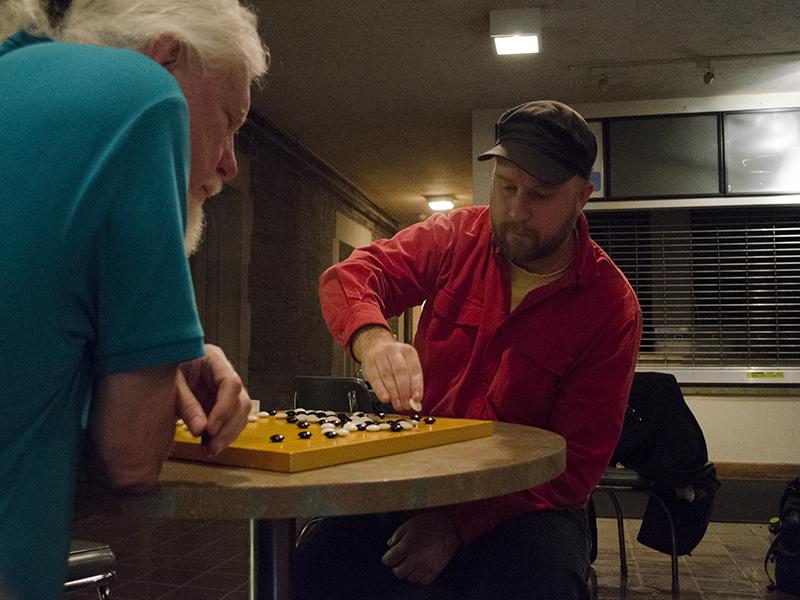It’s a Wednesday night, and Jared Beck and Robert Connelly have been at war for just around two hours — a calculated, gradual battle that has weathered on within Cornell University’s Willard Straight Hall since about 7 p.m. Between them, on a circular cafè table, a checked board is practically covered with black and white stones. They’re saucer-esque, like massive, monochrome M&Ms.
Beck cranes his arm over the board, and lays another white stone down. There’s a silence, then Connelly places one more of his, black. They never remove their eyes from the board, or even pivot their heads to look around, but in this moment, they both manage a chuckle as they evaluate the odds.
This war is, ultimately, a game — one called “Go.” The game, even with its several thousand-year history, still finds itself a home in the modern day through Cornell’s Go Club.
“It’s a game of points, but it’s also a game of life and death,” Robert Connelly, professor of mathematics and faculty advisor for the group, said. “Part of the game is to gain more points that your opponent, to surround as much territory as you can … You have to analyze as well as have a strategic sense of what’s reasonable and what isn’t.”
Even more so, Go is a game of few rules, but massive complexity: played on a grid of 361 quadrants, players place stones in the hopes of gaining “territory,” or board space. Players battle for territory by attempting to encircle the other player’s pieces with their own. For freshman member Ari Krischer, it’s all a matter of breathing room.
“Someone once described it, and I think it’s very true: If you imagine, at the beginning of your turn, all of your stones take a breath of oxygen,” he said. “And if any of them can’t breathe, they die.”
If one player entirely happens to surround another, all those pieces within that area are removed from the game, and the contested territory surrendered to the other player. Compared to many board games — particularly more modern ones — these mechanics are simple, but things things quickly get complex. Like chess, much of it is foresight: evaluating, plotting and besting the other player in a “ko,” a battle for territory. Bowen Zhang, a graduate student who has been playing since his youth, said Go goes beyond just simple prediction.
“I think it’s something like prediction,” Zhang said. “I think it’s like, you calculate the possibility. The possibility of what you play or what your opponent may play… I will calculate, if I play there, and how he will play next, and how can I deal with it?”
Once the stones meet the table, it’s a slow, tense battle. Players are constantly tasked with negotiating offensive and defensive actions. Pursue one capture, or guard from another? It’s a plight that provides Go with its own brand of suspense, and something senior Patrick McLoughlin, secretary of the group, said adds dimension to the entire experience.
“It’s like fighting, like physical fighting, almost,” McLoughlin said. “Like I can choose to not block any of your punches and just try and punch you as hard as I can too, or I can be more reserved and last this out. You can make this analogous to almost anything you want.”
Beyond this mental toil, however, what makes Go so intriguing is its history. To say Go is an old game would be an exceptional understatement, with estimates citing go as anywhere from 2000 to 3000 years old, making it the second oldest documented board game. Wei-chi, the Chinese name for the game, has been a topic of much literature, appearing in writings of Confucius and other scholars.
The game’s true origins remain mysterious, with historians theorizing it could have taught as a wartime strategy, discipline or the dynamic between yin and yang. Nonetheless, Beck said the game’s ancient status only adds intrigue.
“People are drawn to it’s history,” he said. “It’s one of the two oldest games in the world.”
For McLaughlin, this microcosm of gaming doesn’t surprise him. Gathering to play games for two, three, even four hours at a time isn’t anything alien to the Cornell senior, noting that other tabletop games, like popular fantasy card game Magic: The Gathering, have found presence as well.
“I know friends who play board games from anywhere from eight to ten hours at a time, and I know that Cornell has a decent Magic the Gathering population,” he said. “Ithaca in general is just that kind of town.”
Eventually, the games all conclude, Connelly and Beck’s included. Beck comes away victorious, but there’s no bad blood. There’s always new moves to make, new battles to be won, next time.
“It’s one of the highlights of my week,” Krischer said. “Especially because I’m studying engineering and it’s a lot of work, so it’s nice to be able to take a block of time out and come every Wednesday night and play.”














